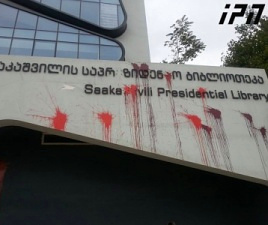
TBILISI, DFWatch–In its latest world report, Human Rights Watch draws attention to a number of alleged violations in Georgia, including political persecution, pressure on the media and ill treatment.
The first chapter on Georgia in the World Report 2016 is about justice and describes a government that is continuing to investigate criminal cases against former officials from the United National Movement (UNM).
“UNM members and supporters allege that the prosecutions are politically motivated, pointing to the absence of clear criteria for determining which cases to prosecute, and that investigations overwhelmingly target UNM members,” the report reads.
As an example, the report’s authors recall the case of former Mayor of Tbilisi Gigi Ugulava, who is member of the UNM and has been in prison for more than year. A court found him not guilty on several charges related to money laundering, but sentenced him to four and a half years in prison in another case.
“The verdict came the day after his release from pretrial detention following a Constitutional Court decision that Ugulava’s 14-month detention exceeded the constitutionally mandated limit of 9 months,” the report reads.
In the same chapter, HRW describes the detention of the director and producer of Tabula TV, as well as one activist, for criticizing the government by putting up posters in the capital that criticized the government’s negotiations with Gazprom.
The next chapter is about targeting political opposition. The report’s authors recall events in last fall, when UNM offices and members were attacked.
“Following the group attacks, Prime Minister Irakli Garibashvili publicly called the UNM a “criminal organization,” and said that “aggression” against the party is “natural.” Some NGOs said Garibashvili’s remarks effectively condoned the violence,” the report reads.
Furthermore, the authors write that Georgia doesn’t have a proper mechanism to investigate law enforcement officials who commit crimes. The report presents figures from Georgian Young Lawyer’s Association (GYLA), showing that the organization received more than 41 reports of alleged torture and ill-treatment in 2015 through October; 23 of them concerned abuse by police, and 18 by prison staff. According to GYLA, the authorities failed to effectively investigate those allegations.
The chapter also highlights the issue of freedom of the media, and describes an ownership dispute over the opposition-leaning TV channel Rustavi 2.
“Rustavi 2’s current owners allege that the lawsuit is a government-orchestrated move to take over the opposition-minded station and plan to appeal the court decisions.”
In August, Imedi TV shut down political talk shows, allegedly as a result of interference by authorities.
Two court cases are mentioned as examples in the chapter about sexual orientation and gender identity. As previously reported by DF Watch, all defendants, including a priest in the Orthodox Church, were acquitted in a trial about offenses on May 17, 2013. That day, a crowd of tens of thousands people, cheered on by clerics, attacked around 30 people who were planning to hold a peaceful gathering to take a stand against homophobia. The court ruled that there was insufficient evidence to prove the guilt of the defendants, even though there were videos and photos available which could have been used as evidence.
The second case concerned a man who was acquitted of murdering the transgender woman Sabi Beriani, who was killed in November, 2014. The suspect was sentenced to four years in jail for violence and damage of property.

